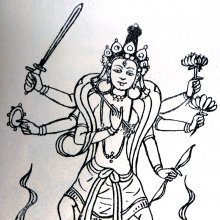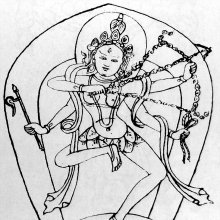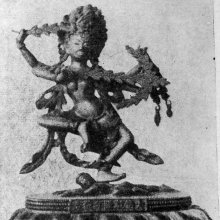Vashikarana, Vaśīkaraṇa: 16 definitions
Introduction:
Vashikarana means something in Hinduism, Sanskrit, Jainism, Prakrit, Hindi. If you want to know the exact meaning, history, etymology or English translation of this term then check out the descriptions on this page. Add your comment or reference to a book if you want to contribute to this summary article.
The Sanskrit term Vaśīkaraṇa can be transliterated into English as Vasikarana or Vashikarana, using the IAST transliteration scheme (?).
Alternative spellings of this word include Vashikaran.
Images (photo gallery)
In Hinduism
Shaktism (Shakta philosophy)
Source: Google Books: ManthanabhairavatantramVaśīkaraṇa (वशीकरण) refers to the “power to control and subjugate”, according to the Kulakaulinīmata.—Although the text does not say so, it is clear that the red Nityā is a form of Kāmeśvarī. She both looks almost the same and grants the same boon, that is, the power to be irresistibly attractive to women. When Nityā is in her black form, she is Kālī. Surrounded by the same Yoginīs, the power to attract women becomes ‘the great force of delusion’ (mahāvega, bhramavega) by means of which the adept can control and even kill his enemies. All forms of magic are based essentially on the power to control and subjugate (vaśīkaraṇa). ‘Black’ rites direct this power at enemies, ‘red’ rites subjugate women and ‘white’ ones are the means to achieve control of higher, spiritual powers.

Shakta (शाक्त, śākta) or Shaktism (śāktism) represents a tradition of Hinduism where the Goddess (Devi) is revered and worshipped. Shakta literature includes a range of scriptures, including various Agamas and Tantras, although its roots may be traced back to the Vedas.
Kavya (poetry)
Source: Brill: Śaivism and the Tantric Traditions (kavya)Vaśīkaraṇa (वशीकरण) refers to “snaring (women) (using magic powders)”, according to Bāṇa’s Kādambarī (p. 226).—There are apparently several Tantric rites that Bāṇa pejoratively associates with the priest: [...] “his ear-cavities were punched by those possessed by Piśāca-demons, who had run to him when struck by white mustard seed he had empowered with mantras more than once”; “he had used magic powders for snaring women (strī-vaśīkaraṇa) many times on aging mendicant ladies, who having arrived from other lands retired [there to rest]”.

Kavya (काव्य, kavya) refers to Sanskrit poetry, a popular ancient Indian tradition of literature. There have been many Sanskrit poets over the ages, hailing from ancient India and beyond. This topic includes mahakavya, or ‘epic poetry’ and natya, or ‘dramatic poetry’.
Ayurveda (science of life)
Source: archive.org: Science And Technology In Medievel India (Ayurveda)Vasikaraṇa (वसिकरण) is the name of a chapter of the Kalpacintāmaṇi.—The work is mentioned in A. Rahman’s Science and Technology in Medievel India: A bibliography of source materials in Sanskrit, Arabic and Persian.—Ancient and medieval India produced a wide range of scientific manuscripts and major contributions lie in the field of medicine, astronomy and mathematics, besides covering encyclopedic glossaries and technical dictionaries.—Vasikaraṇa-prayoga and other chapters of the Kalpacintāmaṇi (also known as Kalpasāgara) deal with sorcery and preparation of patent medicines.

Āyurveda (आयुर्वेद, ayurveda) is a branch of Indian science dealing with medicine, herbalism, taxology, anatomy, surgery, alchemy and related topics. Traditional practice of Āyurveda in ancient India dates back to at least the first millenium BC. Literature is commonly written in Sanskrit using various poetic metres.
In Jainism
General definition (in Jainism)
Source: academia.edu: Tessitori Collection IVaśīkaraṇa (वशीकरण) refers to “bringing other people into one’s own power” (using the sahadevī plant), according to a manuscript (dealing with Hymns to the Jinas, sahadevīkalpa and yantra usages), which is included in the collection of manuscripts at the ‘Vincenzo Joppi’ library, collected by Luigi Pio Tessitori during his visit to Rajasthan between 1914 and 1919.—[...] Unit 3 deals with the uses of the sahadevī plant (Vernonia cinerea liss., purple feabane), alone or in association with other substances. It can be swallowed, put on the body or worn as amulet. This plant is ascribed curative abilities in Āyurveda as a febrifuge or a means to cure dysentery for instance. In Tantra it is said to bring other people into one’s own power (vaśīkaraṇa). All these capacities are dealt with here.

Jainism is an Indian religion of Dharma whose doctrine revolves around harmlessness (ahimsa) towards every living being. The two major branches (Digambara and Svetambara) of Jainism stimulate self-control (or, shramana, ‘self-reliance’) and spiritual development through a path of peace for the soul to progess to the ultimate goal.
Languages of India and abroad
Sanskrit dictionary
Source: DDSA: The practical Sanskrit-English dictionaryVaśīkaraṇa (वशीकरण).—
1) Fascinating, attracting.
2) A cause of attraction or allurement; एकैकमेव हि वशीकरणं गरीयः (ekaikameva hi vaśīkaraṇaṃ garīyaḥ) Mālatīmādhava (Bombay) 6.17.
3) Subduing, subjugation.
Derivable forms: vaśīkaraṇam (वशीकरणम्).
Source: Cologne Digital Sanskrit Dictionaries: Shabda-Sagara Sanskrit-English DictionaryVaśīkaraṇa (वशीकरण).—n. (-ṇa) 1. Subduing or overcoming by drugs, charms, &c., enchanting, charming. 2. Subduing in general. E. vaśa subduing, and karaṇa making, cvi augment, leaving ī.
Source: Cologne Digital Sanskrit Dictionaries: Benfey Sanskrit-English DictionaryVaśīkaraṇa (वशीकरण).—i. e. vaśa-kṛ + ana, 1. Subduing in general, [Pañcatantra] i. [distich] 80. 2. Subduing by magical expedients.
Source: Cologne Digital Sanskrit Dictionaries: Cappeller Sanskrit-English DictionaryVaśīkaraṇa (वशीकरण).—[neuter] [abstract] to [preceding]
Source: Cologne Digital Sanskrit Dictionaries: Monier-Williams Sanskrit-English DictionaryVaśīkaraṇa (वशीकरण):—[=vaśī-karaṇa] [from vaśī > vaś] n. the act of making subject, subjugating, bewitching (by means of spells etc.), overcoming by charms and incantations etc. (with [genitive case] or ifc.), [Pāraskara-gṛhya-sūtra; Rāmāyaṇa; Pañcatantra etc.]
Source: Cologne Digital Sanskrit Dictionaries: Yates Sanskrit-English DictionaryVaśīkaraṇa (वशीकरण):—[vaśī-karaṇa] (ṇaṃ) 1. n. Subduing or overcoming by drugs, &c.
Source: DDSA: Paia-sadda-mahannavo; a comprehensive Prakrit Hindi dictionary (S)Vaśīkaraṇa (वशीकरण) in the Sanskrit language is related to the Prakrit word: Vasīkaraṇa.
[Sanskrit to German]
Sanskrit, also spelled संस्कृतम् (saṃskṛtam), is an ancient language of India commonly seen as the grandmother of the Indo-European language family (even English!). Closely allied with Prakrit and Pali, Sanskrit is more exhaustive in both grammar and terms and has the most extensive collection of literature in the world, greatly surpassing its sister-languages Greek and Latin.
Hindi dictionary
Source: DDSA: A practical Hindi-English dictionaryVaśīkaraṇa (वशीकरण) [Also spelled vashikaran]:—(nm) fascinating or enchanting into submission/control; ~[kṛta] fascinated/enchanted into submission; ~[karaṇa-maṃtra] a conjuration to bring (someone) under complete sway.
...
Prakrit-English dictionary
Source: DDSA: Paia-sadda-mahannavo; a comprehensive Prakrit Hindi dictionaryVasīkaraṇa (वसीकरण) in the Prakrit language is related to the Sanskrit word: Vaśīkaraṇa.
Prakrit is an ancient language closely associated with both Pali and Sanskrit. Jain literature is often composed in this language or sub-dialects, such as the Agamas and their commentaries which are written in Ardhamagadhi and Maharashtri Prakrit. The earliest extant texts can be dated to as early as the 4th century BCE although core portions might be older.
Kannada-English dictionary
Source: Alar: Kannada-English corpusVaśīkaraṇa (ವಶೀಕರಣ):—
1) [noun] a bringing another person under one’s control using magical rites and charms.
2) [noun] the art of this.
Kannada is a Dravidian language (as opposed to the Indo-European language family) mainly spoken in the southwestern region of India.
See also (Relevant definitions)
Partial matches: Vasi, Karana, Vaci.
Starts with: Vashikaranadividhi, Vashikaranastotra, Vashikaranaushadha, Vashikaranavarahimantra.
Full-text: Vasikara, Karmanatva, Vacikaranam, Vashikaran, Mantramula, Mantra, Lilavati, Malati, Candrasena, Tarana, Madhu, Manohara, Bhrama, Bhramavega, Barhicuda, Satkarman, Kurukulla, Abhicara, Tantra.
Relevant text
Search found 16 books and stories containing Vashikarana, Vashi-karana, Vaśī-karaṇa, Vasi-karana, Vaśīkaraṇa, Vasikarana, Vasīkaraṇa, Vaśikaraṇa; (plurals include: Vashikaranas, karanas, karaṇas, Vaśīkaraṇas, Vasikaranas, Vasīkaraṇas, Vaśikaraṇas). You can also click to the full overview containing English textual excerpts. Below are direct links for the most relevant articles:
Garga Samhita (English) (by Danavir Goswami)
Verses 4.11.19-20 < [Chapter 11 - The Story of the Gopīs that were Residents of...]
Sahitya-kaumudi by Baladeva Vidyabhushana (by Gaurapada Dāsa)
Text 10.144 < [Chapter 10 - Ornaments of Meaning]
Kavyamimamsa of Rajasekhara (Study) (by Debabrata Barai)
Part 2.3 - Genesis of Sāhitya-vidyā (literart criticism) < [Chapter 5 - Analyasis and Interpretations of the Kāvyamīmāṃsā]
Stupas in Orissa (Study) (by Meenakshi Chauley)
Tantric Buddhism in Orissa (Introduction) < [Chapter 2]
Vedic influence on the Sun-worship in the Puranas (by Goswami Mitali)
Part 9 - Non-Vedic Elements in the Purāṇic Religion < [Chapter 3 - General Characteristics of the Purāṇic Religion and its Link with the Vedic Tradition]
The Skanda Purana (by G. V. Tagare)
Chapter 78 - Avimukteśvara (avimukta-īśvara-liṅga) < [Section 2 - Caturaśīti-liṅga-māhātmya]


